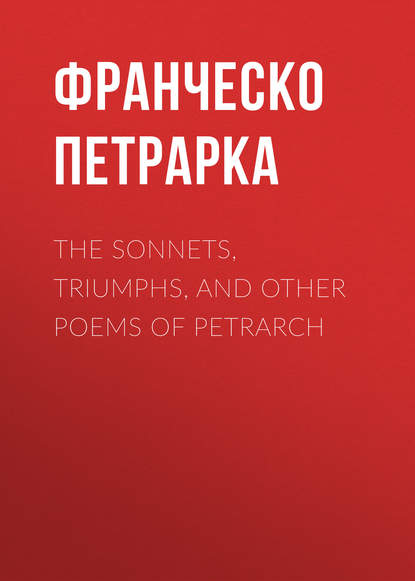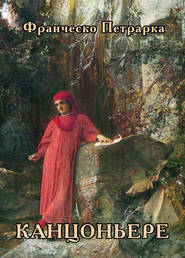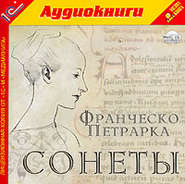По всем вопросам обращайтесь на: info@litportal.ru
(©) 2003-2025.
✖
The Sonnets, Triumphs, and Other Poems of Petrarch
Настройки чтения
Размер шрифта
Высота строк
Поля
The willing objects of respect or love;
And soon a well-known face my notice drew,
Sicilia's king, to whose sagacious view
The scenes of deep futurity display'd
Their birth, through coming Time's disclosing shade.
There my Colonna, too, with glad surprise,
'Mid the pale group, assail'd my startled eyes.
His noble soul was all alive to fame,
Yet holy friendship mix'd her softer claim,
Which in his bosom fix'd her lasting throne,
With Charity, that makes the wants of all her own.
Boyd.
PART III
Io non sapea da tal vista levarme
Still on the warrior band I fix'd my view,
But now a different troop my notice drew:
The sage Palladian tribe, a nobler train,
Whose toils deserve a more exalted strain.
Plato majestic in the front appear'd,
Where wisdom's sacred hand her ensign rear'd.
Celestial blazonry! by heaven bestow'd,
Which, waving high, before the vaward glow'd:
Then came the Stagyrite, whose mental ray
Pierced through all nature like the shafts of day;
And he that, by the unambitious name,
Lover of wisdom, chose to bound his fame.
Then Socrates and Xenophon were seen;
With them a bard of more than earthly mien,
Whom every muse of Jove's immortal choir
Bless'd with a portion of celestial fire:
From ancient Argos to the Phrygian bound
His never-dying strains were borne around
On inspiration's wing, and hill and dale
Echoed the notes of Ilion's mournful tale.
The woes of Thetis, and Ulysses' toils,
His mighty mind recover'd from the spoils
Of envious time, and placed in lasting light
The trophies ransom'd from oblivion's night
The Mantuan bard, responsive to his song,
Co-rival of his glory, walk'd along.
The next with new surprise my notice drew,
Where'er he pass'd spontaneous flowerets grew,
Fit emblems of his style; and close behind
The great Athenian at his lot repined;
Which doom'd him, like a secondary star,
To yield precedence in the wordy war;
Though like the bolts of Jove that shake the spheres,
He lighten'd in their eyes, and thunder'd in their ears.
The assembly felt the shock, the immortal sound,
His Attic rival's fainter accents drown'd.
But now so many candidates for fame
In countless crowds and gay confusion came,
That Memory seem'd her province to resign,
Perplex'd and lost amid the lengthen'd line.
Yet Solon there I spied, for laws renown'd,
Salubrious plants in clean and cultured ground;
But noxious, if malignant hands infuse
In their transmuted stems a baneful juice
Amongst the Romans, Varro next I spied,
The light of linguists, and our country's pride;
Still nearer as he moved, the eye could trace
A new attraction and a nameless grace.
Livy I saw, with dark invidious frown
Listening with pain to Sallust's loud renown;
And Pliny there, profuse of life I found,
Whom love of knowledge to the burning bound
Led unawares; and there Plotinus' shade,
Who dark Platonic truths in fuller light display'd:
He, flying far to 'scape the coming pest,
Was, when he seem'd secure, by death oppressed;
That, fix'd by fate, before he saw the sun,
The careful sophist strove in vain to shun.
Hortensius, Crassus, Galba, next appear'd,
Calvus and Antony, by Rome revered,
The first with Pollio join'd, whose tongue profane
Assail'd the fame of Cicero in vain.
Thucydides, who mark'd distinct and clear
The tardy round of many a bloody year,
And, with a master's graphic skill, pourtray'd
The fields, "whose summer dust with blood was laid;"
And near Herodotus his ninefold roll display'd,
Father of history; and Euclid's vest
The heaven-taught symbols of that art express'd
That measures matter, form, and empty space,
And calculates the planets' heavenly race;
And Porphyry, whose proud obdurate heart
Was proof to mighty Truth's celestial dart;
With sophistry assail'd the cause of God,
And stood in arms against the heavenly code.
Hippocrates, for healing arts renown'd,
And half obscured within the dark profound;
The pair, whom ignorance in ancient days
Adorn'd like deities, with borrow'd rays.
Galen was near, of Pergamus the boast,
Whose skill retrieved the art so nearly lost.
Then Anaxarchus came, who conquer'd pain;
And soon a well-known face my notice drew,
Sicilia's king, to whose sagacious view
The scenes of deep futurity display'd
Their birth, through coming Time's disclosing shade.
There my Colonna, too, with glad surprise,
'Mid the pale group, assail'd my startled eyes.
His noble soul was all alive to fame,
Yet holy friendship mix'd her softer claim,
Which in his bosom fix'd her lasting throne,
With Charity, that makes the wants of all her own.
Boyd.
PART III
Io non sapea da tal vista levarme
Still on the warrior band I fix'd my view,
But now a different troop my notice drew:
The sage Palladian tribe, a nobler train,
Whose toils deserve a more exalted strain.
Plato majestic in the front appear'd,
Where wisdom's sacred hand her ensign rear'd.
Celestial blazonry! by heaven bestow'd,
Which, waving high, before the vaward glow'd:
Then came the Stagyrite, whose mental ray
Pierced through all nature like the shafts of day;
And he that, by the unambitious name,
Lover of wisdom, chose to bound his fame.
Then Socrates and Xenophon were seen;
With them a bard of more than earthly mien,
Whom every muse of Jove's immortal choir
Bless'd with a portion of celestial fire:
From ancient Argos to the Phrygian bound
His never-dying strains were borne around
On inspiration's wing, and hill and dale
Echoed the notes of Ilion's mournful tale.
The woes of Thetis, and Ulysses' toils,
His mighty mind recover'd from the spoils
Of envious time, and placed in lasting light
The trophies ransom'd from oblivion's night
The Mantuan bard, responsive to his song,
Co-rival of his glory, walk'd along.
The next with new surprise my notice drew,
Where'er he pass'd spontaneous flowerets grew,
Fit emblems of his style; and close behind
The great Athenian at his lot repined;
Which doom'd him, like a secondary star,
To yield precedence in the wordy war;
Though like the bolts of Jove that shake the spheres,
He lighten'd in their eyes, and thunder'd in their ears.
The assembly felt the shock, the immortal sound,
His Attic rival's fainter accents drown'd.
But now so many candidates for fame
In countless crowds and gay confusion came,
That Memory seem'd her province to resign,
Perplex'd and lost amid the lengthen'd line.
Yet Solon there I spied, for laws renown'd,
Salubrious plants in clean and cultured ground;
But noxious, if malignant hands infuse
In their transmuted stems a baneful juice
Amongst the Romans, Varro next I spied,
The light of linguists, and our country's pride;
Still nearer as he moved, the eye could trace
A new attraction and a nameless grace.
Livy I saw, with dark invidious frown
Listening with pain to Sallust's loud renown;
And Pliny there, profuse of life I found,
Whom love of knowledge to the burning bound
Led unawares; and there Plotinus' shade,
Who dark Platonic truths in fuller light display'd:
He, flying far to 'scape the coming pest,
Was, when he seem'd secure, by death oppressed;
That, fix'd by fate, before he saw the sun,
The careful sophist strove in vain to shun.
Hortensius, Crassus, Galba, next appear'd,
Calvus and Antony, by Rome revered,
The first with Pollio join'd, whose tongue profane
Assail'd the fame of Cicero in vain.
Thucydides, who mark'd distinct and clear
The tardy round of many a bloody year,
And, with a master's graphic skill, pourtray'd
The fields, "whose summer dust with blood was laid;"
And near Herodotus his ninefold roll display'd,
Father of history; and Euclid's vest
The heaven-taught symbols of that art express'd
That measures matter, form, and empty space,
And calculates the planets' heavenly race;
And Porphyry, whose proud obdurate heart
Was proof to mighty Truth's celestial dart;
With sophistry assail'd the cause of God,
And stood in arms against the heavenly code.
Hippocrates, for healing arts renown'd,
And half obscured within the dark profound;
The pair, whom ignorance in ancient days
Adorn'd like deities, with borrow'd rays.
Galen was near, of Pergamus the boast,
Whose skill retrieved the art so nearly lost.
Then Anaxarchus came, who conquer'd pain;














